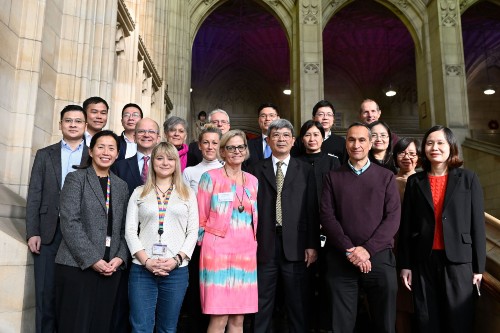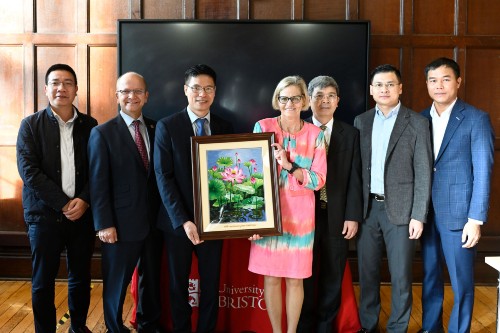
Scientists from the University of Bristol, Imperial College London and Vabiotech Vietnam met in Bristol to celebrate updates to the Future Vaccines Manufacturing and Research (FVMR) Centre, a £10.5m international collaboration funded by EPSRC and DHSC Project to develop manufacturing capabilities in developing countries
Photography by Bagesh Sahaniya

Dr. Dat from Vabiotech Vietnam presented a gift to Professor Agnes Nairn, Vice-President of Global Engagement at the University of Bristol.
Photography by Bagesh Sahaniya
November 3, 2023
A new collaboration between UK universities and countries around the world to share cutting-edge vaccine technology to prevent future global infectious disease outbreaks has received funding from the UK Department of Health and Social Care (DHSC) and the Engineering and Physical Sciences Research Council £10.5m (EPSRC).
The funding will support the Future Vaccine Manufacturing Research Hub (FVMR Hub) to continue operations for five years, until 2029. The center was originally established in 2017 by Imperial College London in partnership with the University of Bristol.
As part of this partnership, Bristol’s world-leading vaccine scientists are working with Vabiotech, one of Vietnam’s leading vaccine manufacturers, to share their expertise in the use of powerful recombinant production technology that relies on Production tools for synthetic baculoviruses. The technology, pioneered in Bristol, is particularly suitable for mass-producing next-generation vaccines in insect cells, which can be easily and cost-effectively grown in Vietnam.
To mark the funding announcement and launch the vaccine hub operations, University of Bristol researchers welcomed representatives from Vietnam’s Ministry of Health, the Embassy of Vietnam in the UK, Vabiotech’s CEO and research team, and leading vaccine scientists and hub partners Imperial College London A reception will be held at the Wells Memorial Building. The visit included a tour of Bristol’s high-tech facilities, including a robotics laboratory, cryo-electron microscopy facility and a new biosafety level 3 virology laboratory, all of which have been set up during the COVID-19 pandemic.
Professor Imre Berger, Director of the Max Planck-Bristol Center for Minimal Biology at the University of Bristol and Head of the FVMR Center in Bristol, said: “Our partner Vabiotech is very interested in using the technology we have developed in Bristol. There is a particular interest in producing vaccines against rabies and avian influenza, both of which are significant challenges for Vietnam. A few years ago we saw how avian influenza that started in Vietnam quickly developed into a global threat to humans around the world. We will be working with Together with Vabiotech, we apply cutting-edge technology where it provides cost-effective protection.
Professor Agnes Nairn, Vice-Chancellor (Global Engagement) at the University of Bristol, said: “As a university, we are committed to building research partnerships that help to have a positive impact on the health of populations around the world, and this initiative aims to We are delighted with the new funding for the Vaccine Centre, which will allow us to continue our efforts to combat infectious diseases that can affect us all. “
Professor Robin Shattock, Head of the Department of Mucosal Infection and Immunity at Imperial College London and Principal Investigator of the Centre, said: “By establishing a future vaccine manufacturing centre, we hope to harness the next wave of biotech innovation to rapidly respond to emerging outbreaks and ‘maximize the risk of infection’. of countries are able to meet local vaccine needs. “
Dr Dat, CEO and Senior Advisor at Vabiotech, said: “Working together to help prevent and combat the spread of infectious diseases has never been more important. The new cost-effective vaccine technology pioneered in Bristol and shared with Vabiotech is one example of this. will help many people in our country and ultimately others who will receive these vaccines.”
The centers were announced by Health and Secondary Care Minister Will Quince. He said: “I’m delighted that the UK is building strong partnerships with researchers around the world by funding these innovative vaccine hubs, which will support partners in Africa and South East Asia to increase vaccine production capacity.
“These innovative partnerships between UK universities and vaccine developers – with UK aid funding of £33m – will ensure everyone in need has access to a vaccine and enable us to ensure domestic safety by accelerating the supply of new vaccines. future-proof health systems to prepare for future epidemics.”
Professor Jeremy Tavare, Vice-President and Executive Dean of Health and Life Sciences at the University of Bristol, attended the meeting; Professor Huang Liangfang, Vice-President for Internationalization; Professor Michele Barbour, Vice-President for Enterprise and Innovation; Professor Elek Molnar, International Director of the School of Life Sciences; Professor Nigel Savery, Head of the School of Biochemistry; and Dr Kathleen Sedgley, Mr Wayne Powell and Ms Justyna Gol from the Bristol Biodesign Institute.
The program is funded by the UK Department of Health and Social Care as part of the UK Vaccine Network (UKVN), a UK aid program that develops vaccines against potentially endemic diseases in low- and middle-income countries (LMIC).
More information
About the UK Vaccine Network
The Department of Health and Social Care (DHSC) is the UK government department responsible for helping people live more independent, healthier, longer lives. The investment is part of the UK Vaccine Network (UKVN). UKVN was established to provide funding to support the development of promising vaccines and vaccine technologies to help combat infectious diseases that may be endemic in low- and middle-income countries (LMICs). UKVN is a £120 million investment in UK aid, which means all funded projects must primarily support research that directly benefits people in low- and middle-income countries (LMICs).
About Professor Imre Berger
Professor Imre Berger is Director of the Max Planck-Bristol Center for Minimal Biology, a partnership between the University of Bristol and the Max Planck Society for the Advancement of Science (MPG) in Germany. It aims to advance the future of health and medicine by understanding the fundamental nature of life. Professor Berger is also co-director of the Bristol Biodesign Institute and a partner in the European Commission’s ADDovenom consortium project to develop new snake bite treatments, using the same manufacturing technology used by the FMHR center to produce the new vaccine.
About the Future Vaccine Manufacturing Research Center (FVMR Hub)
The FVMR Center is a £10.5 million award from the Department of Health and Social Care and administered by the Engineering and Physical Sciences Research Council. A key aim of the FVMR Center is to research and develop new cost-effective vaccines that impact populations in low- or middle-income countries, consistent with the UK’s commitment to provide Official Development Assistance (ODA). The Future Vaccine Manufacturing Center is led by Imperial College London. Initial new manufacturing projects will take place in Vietnam, Bangladesh, South Africa and the UK, with expansion to other countries over the course of the project.
About VABIOTECH
VABIOTECH is one of the leading companies in Vietnam engaged in manufacturing, trading, researching and developing various vaccines and biological products for human use, analyzing samples of newly developed vaccines and biological products, diagnostic kits, therapeutic products, pharmaceuticals; cosmetics, nutrition Food, provision of health care services.
As the largest vaccine manufacturer and supplier of Vietnam’s National Expanded Immunization Program with GMP qualified facilities, VABIOTECH is proud of its contribution to the prevention, elimination and phase-out of dangerous infectious diseases to improve children’s health in Vietnam.
Currently, VABIOTECH produces four vaccines for hepatitis B, hepatitis A, Japanese encephalitis, and oral cholera, as well as a series of diagnostic kits for detecting HBsAg, anti-HBs, anti-HCV, and anti-HIV. In addition, VABIOTECH also imports and supplies some other vaccines and biological products to meet market needs, such as mumps, rubella, meningococcus and varicella.
VABIOTECH is highly committed to providing the best products at great prices to protect the health and well-being of the Vietnamese people.
FVMR Hub collaborators and guests from Vietnam
Vietnamese collaborators and guests attending the meeting also included Mr. Dang Xu Cong and Mr. Le Thanh Binh, senior officials of science and training at the Ministry of Health of Vietnam, Mr. Nguyen Trung Kien, First Secretary and Director of the Science and Technology Office, General Manager and General Manager of Vabiotech, Embassy of Vietnam in the UK Dr. Nguyen Anh Tuan, Chief Operating Officer, Dr. Phan Hong Hoa, Deputy Director, Ms. Lê Thi Thanh Hà, Director of Accounting and Finance Department, Ms. Lê Thu Hang, Director of Finance Department, Ms. Vu Hong Nga, Director of Material Purchasing Department and R&D Department.
Imperial College London FVMR Hub Collaborator
Imperial College project collaborators also present at the meeting included Professor Nilay Shah from the School of Engineering, Professor Rongjun Chen from the Department of Chemical Engineering and Dr Sarah Joseph, FVMR Center Manager.
About the Max Planck Bristol Center
The Max Planck Bristol Center (MPBC) is a joint research center between the Max Planck Society and the University of Bristol. MPBC specializes in the areas of synthetic and minimal biology. MPBC scientists, based in Bristol with nodes at the Max Planck Institute in Martinsried, Mainz and Heidelberg, aim to build synthetic vaccines, artificial cells, cytoskeletons and nanoscale molecular machines, To study the building blocks needed for life and their applications. The core manufacturing technology used to produce the new vaccine at the FVMR Center was developed at the Max Planck Center in Bristol.
About Bristol Biodesign Institute
The Bristol Biodesign Institute (BBI) coordinates synthetic biology research, training and innovation at the University of Bristol. With applications ranging from health to food security, BBI brings together graduate and postdoctoral researchers, academics, policymakers and industry through multidisciplinary research, while also making emerging solutions to global challenges available to the public.
